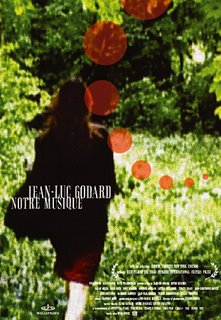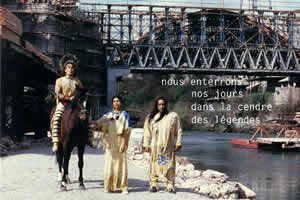 Plot Summary
Plot SummaryNotre musique (Our Music) is a 2004 film directed by Jean-Luc Godard. The film reflects on violence, morality, and the representation of violence in film, and touches especially on past colonialism and the current Israel-Palestine conflict. The film's tripartite structure is apparently inspired by the Divine Comedy of Dante; the film's three segments are titled "Realm 1: Hell", "Realm 2: Purgatory", and "Realm 3: Heaven". The first segment is a relatively brief, non-narrative montage composed of war footage, propaganda footage, and battle scenes from fictional films, constantly intercut, and accompanied by classical piano. The second segment, which is relatively straightforwardly narrative, makes up the bulk of the film. It tells the story of two young women visiting a European arts conference in Sarajevo: Judith Lerner (Sarah Adler), a journalist from Tel Aviv, and Olga Brodsky (Nade Dieu), a French-speaking Jew of Russian descent. Judith interviews the poet Mahmoud Darwish (played by himself) at the conference, and surveys the city, visiting the Mostar bridge (where she reads Emmanuel Levinas). Olga makes a digital-video film of the conference, is visited by her uncle Ramos Garcia (Rony Kramer), who is translating for the conference, and attends a lecture on film by Godard (who plays himself). The Spanish poet Juan Goytisolo also appears as himself. The third segment, a brief postlude, shows Olga walking contemplatively through a quiet lakeside setting which appears to be guarded by American soldiers.
Screen Shots





1 comment:
“Our Music” by Jean-Luc Godard (2004) is simultaneously, a documentary and fiction-film (where fictional part keeps the “ascetic”/essential acting and where both parts follow Godard’s cinemagodarfically dense and intense montage). It is documentary in its representation of the typical characters of our times - the oblivious, though the suffering majority – those who just live through periods of happy forgetfulness and moments of grieving about their personal deprivations and traumas, with the hope that the next episode of historical violence (created by human indiscretion, frustration and megalomania) or unlucky occasions of accidents will somehow spare them. And it is a fictional film in its depiction of exceptional characters (those who play themselves without any proud awareness of their exceptionality, or played by actors without any self-admiring imposition on the viewers’ perception). The second category of human beings (addressed as fictional characters) are those who are awakened from the engulfing philistine dream of being naïve consumers of life, those whose compassion towards human suffering and concern for the destiny of humankind made them alert to how anomalous human life in today’ societies is and how tragically stupid we are in our passivity of carrying load of our greed and hubris as our banner in rivaling with others. These are those who are trying to do something to help to change the human historical habits and societal life. These critical minds and empathic and compassionate souls Godard classifies as two types of people which can be named as angelic humans and human angels in the most “prosaic” sense of these terms divorcing them from their mythological connotations. In spite of Godard’s self-impersonation as person with a genuine humility (as he is in life and, most obviously so, in his later years), we cannot help but to recognize him as belonging to the one of these two categories of special people in whom we cannot find neither frivolity nor vanity because of spiritual seriousness of their critical dedication to life and because they are able to overcome the very axiom of the difference between private and public, an axiom based on our deep narcissistic desire for being distinguished among others – bigger and taller than others. Godard’s images of angelic humans and human angels don’t mean seeing them as superhuman beings, but conversely, as more human (more human in their ordinariness) than people who can be rude and even vulgar in their primitive pretentiousness. They are people whose humanity is awakened by the general lot of human suffering and by their understanding that continuation of human intolerance of otherness expressed in our proclivity to manipulate and exploit each other and nature, can have fatal consequences for the destiny of humanity. It is this understanding that made them more self-reflectively alert, more conscious about the shortcomings of the human race. Godard’s “Our Music” is about life of everybody and about the necessity to change it in order to save us and our planet. It is a film about human soul trying to stay alive, and a planetary film of our present and future. The absence, in this film, of enemies personified is very important – there is no place for hate and there are no human beings to scapegoat. “Our Music” is an education without educating – disinterested and universal. It is dedicated to everybody who lived, lives and will be living in this world.
By Victor Enyutin
Post a Comment